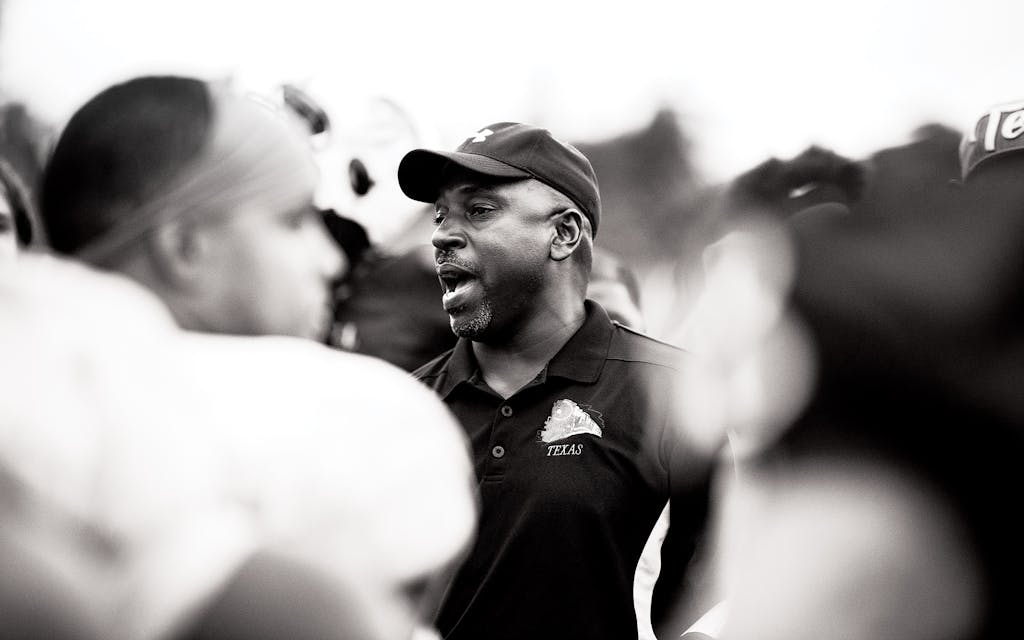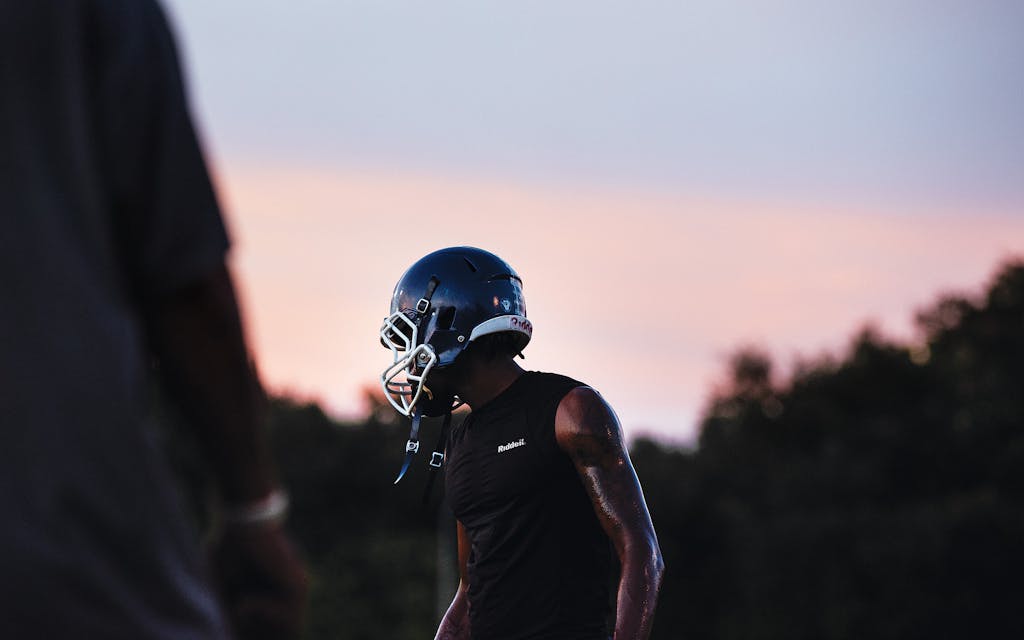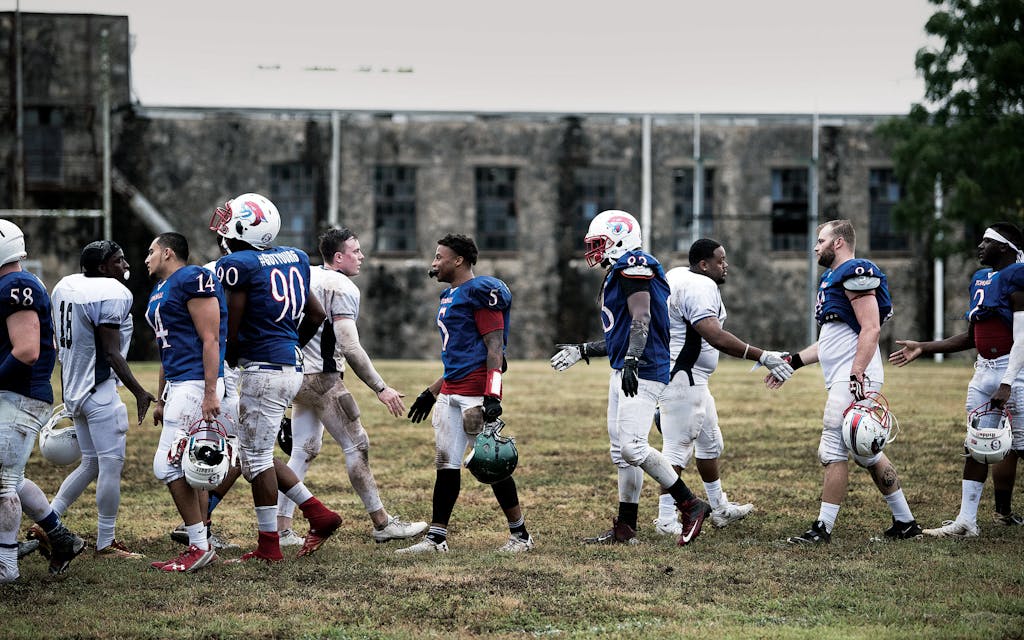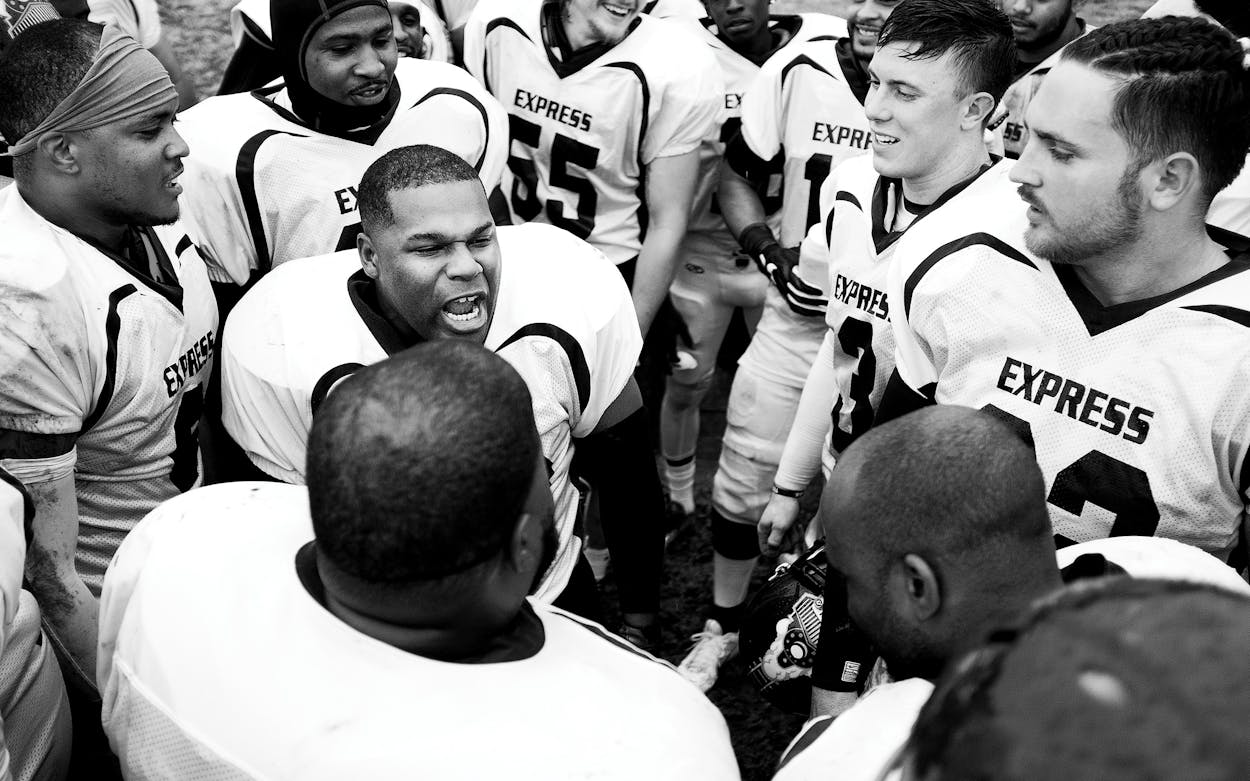They come here, to Brenham, from far away—from Beaumont, from Corpus, from College Station—pilgrims to their church. Maybe they were never quite good enough to cross through the gates into the kingdom of immortality, the $75 billion industry of the National Football League, but they have nonetheless found a way to stay on the gridiron.
They play for the Texas Express, Brenham’s minor league football team, of the Dynamic Texas Football Association, one of several such leagues that span the state and field a few thousand players during any given week. I came to them picturing an entire team, fifty players strong, each gloriously, or foolishly, unable or unwilling to let it go. But it’s hardly like that at all. Some of them come to take one last shot at the big time, others to prove something to themselves, or find a purpose, or escape the stresses of their days. Some of them come simply to stay out of jail.
They play in the spring rather than the fall, one of many curious things about the league. The term “minor league” itself is curious, in that it suggests that the players get paid some small amount. Not multimillion-dollar contracts but at least a percentage of the gate, or any other receipts. But there are no receipts. The players have to pay $125 to $140 to join the Brenham team, and they buy their own uniforms.
And yet, they are not being used, or abused. They are playing on the green grass of springtime in the long shade of twilight in the heart of Texas, an hour northwest of Houston. Practice comes two evenings a week, in the center of what feels like a hundred acres of mown field, a once-upon-a-time soccer and baseball complex on the outskirts of town that sits mostly empty ever since a new, more centrally located complex supplanted it. When the Express come to practice, this play field ringed by oaks is theirs, all theirs.
Brenham’s a small entry in the league’s pool; there are also teams in Houston, Austin, Fort Bend, and beyond—twelve teams in all. It’s late April. One game lies between the Express and a DTFA playoff berth, one practice until that game.

They come drifting in from the sunlight and long heat of the day, converging on the softer light of early evening and the first precious hint of cool. They are grown men, still wearing their work clothes, salt-stained from the sweat of the day. They do not come from privilege. Some work two or even three jobs. Truck drivers, security guards, septic tank cleaners.
Jarvis Brown is here with his girlfriend, Kinesha Rogers, and their new dog, a sweet young pit bull who looks like gentle Jarvis himself, who happens to be the brother of ex-Longhorn star Malcom Brown, now of the New England Patriots.
Another young man drifts in, slender as a pipe cleaner and wearing a haunted expression, like a man half-looking over his shoulder, half-looking ahead. (And aren’t we all?) He has long dreadlocks, and his name is Patrick Smith. He is a dead ringer for a wide receiver, with long legs and a cranelike carriage. But no, he’s a quarterback.
Players’ positions on the Texas Express are not identifiable by body type. Here, a man one might identify in the pros as clearly being a nose tackle—a six-foot-two, 305-pound mammoth of a man—turns out to be the starting quarterback, Lloyd “Phat” Turner.
One of my favorite players is among the oldest, at forty. David Hallback, a muscular safety, sports fantastic gold teeth and wears a bandanna in tribute to his favorite player, Deion Sanders. He’s a landscaper, digs holes, plants trees by hand. He’s got a litany of nagging injuries or ailments, and as we visit he tapes various parts of himself—a wrist on one side, forearm on the other, a bruised thigh. This is his seventeenth season, he says, and his last. He’s been nursing a bad shoulder all year—sounds like it’s a torn rotator cuff—but there’s nothing for that other than Advil. The only thing more difficult in his condition than tackling a ball carrier would be digging holes all day, planting trees. He says it’s extra sore today, that he planted eight of them. Usually, getting six in the ground is a good day.

Only about twenty-some players show up, maybe half the team, barely enough to field a squad. More usually show up on game day, which frustrates their coach, fifty-year-old Anthony Barnes, a garbage truck driver by day, to no end.
As practice begins, I chat with Barnes between drills. He speaks affably with me as the players snap the ball and run their routes—tells me about his days playing semipro, decades ago in Katy—but his eyes whip back, always, to the practice, observing and analyzing what is, and what should be. He hints at some trouble in his own history; now he’s a born-again Christian.
When I ask him what’s most gratifying about coaching, he says it’s keeping players off the streets. “I try to get God in their lives,” he tells me. “I’ve only lost two to the penitentiary and four to death in nine years.” When the players are short on money to get to practice, or can’t buy groceries, Coach will spot them some cash. More than one player tells me later that Coach Barnes has saved his life.
On the field, the running backs are frisky, sensing it’s quite likely they’re going to be used heavily in Saturday’s game; the forecast calls for rain. They run with confidence and creativity. The receivers don’t drop their passes, though the passes are a little fluttery—the deeper they are, the more they wobble, so that as the evening goes on, they fall shorter and shorter. Arms tire. Footwork becomes less disciplined, not more.
The shadows lengthen. Night comes. They came together for a couple of hours, they testified, rededicated, and now they are going back out into the dark. But first a prayer, all heads lowered, a huddle of young men listening to an elder. “We could be dead!” Coach prays. “Some people didn’t wake up today, didn’t get up—they died! Keep a halo around us, Lord. We thank you for all those interceptions in our last game. We know that all of us could be sleeping in our graves. We are still alive! Help us to do your will. And help us get to practices.”


The game. It’s against the Cedar Park Punishers. It’s in a real football stadium, with a real press box, not that there is any press. That the stands are all but empty is a little strange, but not as much as you’d think. The field is what matters. It’s just a high school stadium, Cedar Park High, in a northern Austin suburb, but at a big school in Texas, that’s pretty similar to the college stadiums I remember from Utah and Idaho in the seventies.
Doran Toussom, an immigrant from Cameroon who grew up in Houston, is suited up entirely, looking sharp and all ready to go, while other players sit in the bleachers and on benches in various states of readiness. A few stretch, but for the most part the players scramble for little bits and pieces—a buckle for a helmet, a mouth guard, a missing glove—deep in the reaches of their duffels. They don’t have access to the locker rooms here, so they are living out of their bags.
The kickoff, the most perilous moment in any game, has all the ritualistic tension you’d feel in an NFL stadium. There’s the run-up, the kick, the ball spinning through the air, and everyone running full tilt, as if storming the beaches, toward an inevitable violent collision. The Express receive, the returner breaks to the outside, puts on a little puff of speed, but then is tripped up.
The game batters and slugs back and forth. No one dominates. At times it brings to mind a gun firing blanks—the ball is snapped, the hammer drops and strikes the firing pin, but no bullet comes out. Not like the pros. And how could it be?
Even big Lloyd Turner has trouble. He looks like Gulliver amid the Lilliputians, but the Cedar Park defenders bring him down with one-on-one attempts. He is hurried, indecisive. And the offensive line is leaking. The Punishers sack Turner three times in a row.
On defense, however, Hallback is a dervish. He, most among them, looks the pro—fending off blockers, throwing them aside, reading the runner, squaring up to the runner’s numbers and popping them so hard you can hear the plastic-on-plastic smack.
Smith goes in for Turner and runs a few sweeps, pitches and flash-screens to the wide receivers, to get the ball out of that ferocious pressure coming from up the middle, and starts to move the ball down the field. Brenham scores but misses the extra point.
Hallback, who has been single-handedly shutting down the right side of the offense—stripping the ball from carriers, knifing through blockers—continues to impose his will. He plays at such a higher level than anyone around him that Cedar Park begins double- and sometimes even triple-teaming him. Blocking him in the back. They’ve got to do something. He’s still slipping out of their holds and still pulling down the runners.

After one play in which a runner finally gets around the edge and scoots just past him, Hallback loses his cool. He leaps up, waves his arms, howls at the ref—where are the flags? All the way across the field, I see his gold teeth flashing like a semaphore, and the Cedar Park players, having regained some vestige of control, appear delighted. Suddenly Hallback is in their midst, trying to confront one or another of them, and a yellow flag launches like a flare from one of the refs. Coach Barnes, who is about nothing if not control and discipline, now loses his cool, goes charging out onto the field to summon Hallback away from the scrum.
Coach puts his big hand on Hallback’s shoulder and then wraps both arms around him—a bear hug of restraint—so that for a second it seems he’s tackling the player. “He was blocking me in the back,” Hallback says, sounding as heartbroken as a five-year-old—it isn’t fair—and Coach has to walk him farther away from the field, away from the sidelines, out to the cinder track that encircles the stadium.
The game proceeds, uncaring for the personal drama at its perimeter. Without their star safety, the Express move in reverse. The Punishers advance the ball, and soon enough they’re across the goal line, which sets off a new round of lamentations by Hallback, who has returned to the sideline. Some players move away from him, while others try to console him. If the Express don’t win a playoff berth, this could be the last game of Hallback’s life.


Brenham gets the ball back, and Smith puts together a little drive that turns into a big drive when, on third and long, they convert on a pass play. The running backs start to take control of the game, ripping off 6 and then 10 and 12 yards at a time. The offensive linemen keep up their run-blocking, if not yet stopping the pass rush. The Express score a touchdown.
Now it’s the defense’s turn to stop Cedar Park, and—not yet with forgiveness but with a weary utility—Coach nods that Hallback can go back out onto the field. He fumbles with his helmet, pulls it on quickly, bolts from the bench, runs out across the field, not like the extraordinarily fit man he is, looking over the fence at the nearing territory of middle age, but instead like a boy, running out to join his teammates.
By the fourth quarter Cedar Park is wearing down and, after three quarters of practice, the Express are starting to come together. They send Brown up the middle again and again, devouring the clock. They win the game. They’ve made the playoffs.
Afterward, Coach speaks to the team. Everyone stands in a circle, midfield. “We got lucky,” Coach says. Tough love is his job, and it’s why the players keep coming back to him—to be bridled, to be directed. To be coached. To be given a place where they can protect—protect the ball, protect the quarterback, protect the lead, protect the clock—but also be protected. They are safe here. They know the rules, they have a hand in the outcome.
Still, they want good times too. They came here to play. To remember the basics of running and jumping, leaping and diving, tumbling and rolling. To get up and run again and to be with one another, briefly, and finally, as a team.
“Gentlemen,” Coach says, “the Ugly Thing reared its head again. The Ugly Thing came into our midst again, and we did not strike it down. I will not say its name.” The huddle is silent, and I can hear every player breathing. “If we are to get better, we must not let the Ugly Thing come into our presence and have its way with us again.”

Perhaps for him the Ugly Thing is their not showing up for practice, their not being perfect. He wants to be able to mold and shape them, but how can he work with what isn’t there? Coach falls silent, but the players are still listening, no doubt considering whatever the Ugly Thing is for each of them. It does not matter that they will not advance beyond the first round of the playoffs. Nothing matters except right now: that they were flawed but were delivered a victory nonetheless.
There is no one in the stands, and Cedar Park has already packed up and left. The springtime humidity is building, and not-so-distant lightning cleaves the now-black sky. A mist begins to fall, sheets and waves of it drifting past the high halogen lights and cooling us all. The players run back to the sidelines to gather their gear, then run for their cars and trucks, laughing and calling out to one another in the night in some combination of joy and relief.
This is the thing about football, or one of the things—whether pro, minor league, or any variety. Sometimes, for a fleeting moment, it can be perfect. Complicated and perfect. And how lovely to glimpse such a dream.







